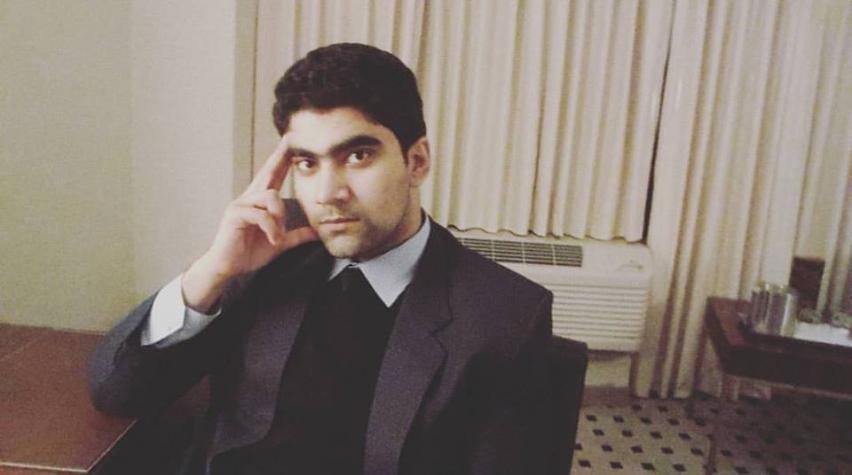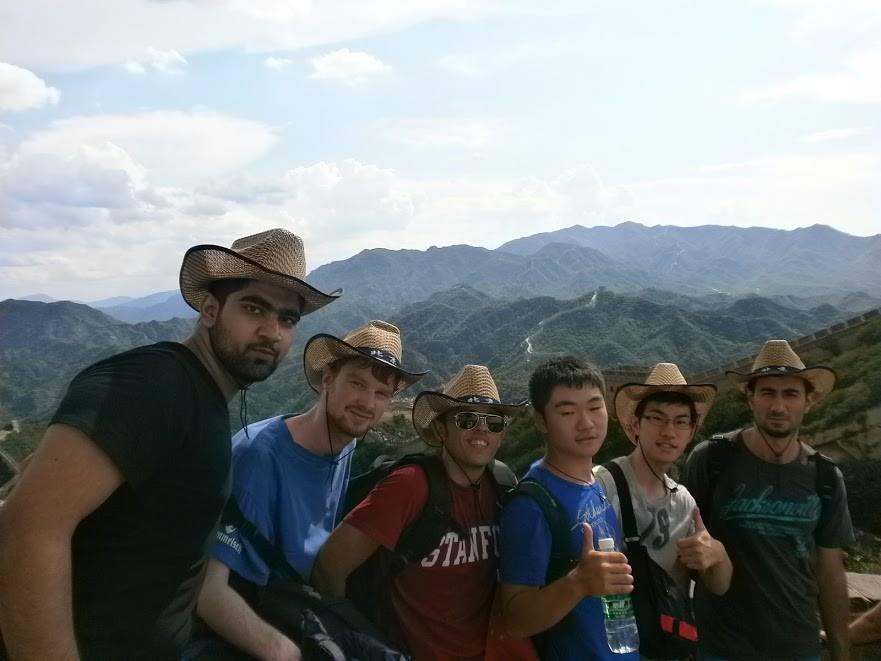
Where are you from?
Pakistani, but born and raised in Abu Dhabi, UAE
What school do you go to? What year are you?
Junior, United Arab Emirates University
Do you hold any positions in your AIChE chapter or with AIChE nationally?
President, AIChE Student Chapter UAEU
Describe an event in your chapter that you are most proud to have been involved with.
Innovative Idea competition — part of innovation week — where students from all engineering departments presented innovative ideas. The AIChE Student Chapter members actively took part in organizing this big event. The innovation week was a huge success in many ways. The student chapter officers had to write funding proposals and do all sorts of logistic work. The event itself was very interesting as I noticed that many students who previously were not interested in research were exposed to the process of research by participating in this competition. There was an open call for idea submission from any engineering discipline, and the students were then asked to prepare posters for their work. The students' work was then assessed by the faculty members. I believe the discussion among students and faculty in such an open-ended platform promoted innovation and creativity, as well as facilitated the transfer of knowledge and experience throughout the community. There were then talks given by different industry and academic experts on topics like how to market technology, how to establish a culture of excellence and innovation, and how the university can help with registering patents and the transfer of technology. Dr. Jonathan Fleming from Oxford Bioscience Venture Capital, a senior lecturer at the University of Massachusetts, Boston, USA was invited to our university. He delivered a lecture on intellectual property rights entitled "Commercializing Innovation in Energy, Water, Biotechnology and the Electronics Industries," in which he talked about how to market inventions and transfer technology from a laboratory to industrial products. There was a lot of interaction and discussion between faculty, students, and experts in the field.
What are your plans after graduation? In what field are you most interested in having an impact?
I have been involved in research since my first year of college. My extended time at the bench has allowed me to be really sure that I enjoy research and that graduate school is the right next step for me. Each research experience has not only taught me new technical skills and specific knowledge but has reinforced my enthusiasm and commitment for research. I am convinced that research can improve the lives of hundreds of people, thus changing the world for many people, one project at a time. I see myself having an impact in biological engineering since my research projects have revolved around this topic (scaffolds for bone regeneration, drug penetration through blood-brain barrier). To have an impact in any field one has to work deeply in that field for a sustained period of time. The impact comes after a lot of silent hard work. I don't think I have attained enough hours of silent hard work, but I am determined to do so in the near future. Graduate school will be a perfect place to become a true erudite. I believe graduate-level study combined with good financial knowledge and leadership skills is a recipe for career success.

What is it about chemical engineering that you’re most passionate about?
Engineering is about finding innovative solutions to problems. Chemical engineering opens doors for so many industries and gives students and professional an amazing range of skills to help solve these problems. I love the variety of projects and industries that chemical engineering provides.
How do you think your experience within your AIChE Student Chapter will impact your career and professional goals?
My definition of passion is "the interest you develop in something you have more control on and something that gives you the most output in terms of personal satisfaction." Research in chemical engineering is something I am passionate about. It is all about playing with molecules. Chemical engineering should be named molecular engineering. Pick any topic for research and you play with the molecules and see the impact it has on a larger scale. The breadth and depth of chemical engineering is something that intrigues me. When I was in high school I used to read my elder brother's university course catalog. The interesting thing about the chemical engineering courses was that they were very diverse. One could take a course in biochemical separation, natural gas processing, polymer engineering, renewable energy, environmental management and so on. The challenge is to make a connection among these diverse courses, that is, how are the skill and knowledge in one subject related to another. My interactions with graduate students and other research associates also stimulated my interest in pursuing chemical engineering. What I noticed from their experience was that they didn't had any concrete idea of what they would work on, they in many cases didn't know what they are good at. This can positive thing as one can creatively connect the dots of their diverse skill set and come up with unique problem-solving ability that can later be translated to what we call a job. The chemical engineers I found on LinkedIn were working as process engineers, sales executive, supply chain manager, researchers etc. In short, anyone studying chemical engineering should not be dismayed by thinking about how saturated the market is and how much struggle will be involved in getting a job but think about what unique skills have you developed and what can you offer to the world.
What are you studying that you think could change the world someday?
Research: As part of my undergraduate research program in bio-sciences, I have worked on a project. The project that I have worked on lately involves the study of HDPE-based nanocomposites with graphene nanoparticles as enrichment; the objective was to investigate the suitability of these polymeric nanocomposites as a potential scaffold for bone regeneration. My group members and I fabricated the injection-molded scaffolds and performed several different cell-culture protocols to assess cell viability, proliferation, and the presence of mineral deposits such as calcium. Course: Mass transfer- Whether it is penetrating the drug into neurones or cleaning water for safe use, mass transfer principles are of immense importance if a chemical engineer has to do something big.
How do you think your experience within your AIChE Student Chapter will impact your career and professional goals?
I always enjoyed working with students from colleges all around the world in several international forums and conferences. The energy and enthusiasm in these forums motivated me to perform my best. The participants in these gatherings were confident in expressing their views and had a touch of professionalism in their personality, in addition to deep erudition in subject matter. I admired their personality traits and wanted to emulate them. I Used to read a lot Harvard Business Review leadership journals. I am also a big fan of Jack Welch and am inspired by his leadership abilities. AIChE student chapter is a platform to practice these leadership skills. I continuously think of what strategy to apply to motivate the fellow students, to carry out an activity in a shorter time, how to find funds, etc. These skills I believe are instrumental in the real work place. The graduate recruiting fair at the annual conference was a wonderful opportunity to talk to university’s representatives. Luckily, most of the representatives were either postdocs or PhD candidates. I always had doubts whether to pursue a PhD or not. Getting firsthand experience from PhD students was very helpful and now I have finally made a list of universities where I will apply for my PhD. Being part of AIChE makes me realize that leading people well isn’t about driving them, directing them, or coercing them; it is about compelling them to join you in pushing into a new territory.
How do you blow off steam and keep your sanity between classes, homework, and projects?
Gym, long walks, chess, driving to nearby hot springs, and reading Richard Feynman.
Which of your undergraduate classes have you most enjoyed?
Introduction to chemical engineering, organic chemistry lab, introduction to programing, mass transfer, linguistics and world regional geography.
How did you decide to pursue a degree in ChE?
I always wanted to become a medical doctor until I was in grade 10. But during my A-Levels (grade 11 and 12) I really enjoyed the high level math and chemistry courses. By the end of grade 12 I wanted to do something that would challenge my analytical thinking and would keep an option of becoming medical doctor open for me. I found that many medical school applicants pursue chemical engineering to fulfill their pre-med requirements. Therefore, I chose chemical engineering.
What is the best kept secret on your campus?
The cafeteria in the food court serves a tea traditionally known as chai karak in Arabic and Urdu. It is simply a strong tea with milk, which I feel is stronger than coffee in my case. The secret is that many students don't know it is a great stress reliever.
What are you most looking forward to after graduation?
Professional goals on one side - I want to finish reading all the books I bought from free university coupons every year at the Abu Dhabi Book Fair. I have to confess openly that I have more than 50 books in a cardboard box on the balcony of my flat — there is simply not enough time to read those books. I would also want to get a motorbike license and ride up to the mountains. The top places on my list are hill stations Himalaya and Karakoram mountain ranges in Pakistan. I was inspired by my friend from ETH Zurich who rented a motorbike to ride up to the mountains in Tokyo. I would certainly do the same.
What will you be most saddened to leave behind at school when you move on?
The supportive faculty members, the research associates, the library and librarians (who offered me cupcakes and fresh juice many times).The engineering building which is open 24/7 and is a safe haven to study in those grueling exam days.
Do you have any advice to incoming students and underclassmen ChEs around the world?
Use social media wisely: Use it to find people of value. Don't waste time watching series marathon. Don't worry about job rather focus on obtaining knowledge and mastering skills. Build good a work ethic, find out how study method varies for different courses. Build a good network of industry representatives, professors, research associates, etc. Talk to professors about anything — their life experiences, their hardships, their achievements, a couple of times a week. Take initiatives — start a student chapter, do research, attend leadership programs, find out opportunities abroad, and save some money to travel in summer.
How would you like to be involved with AIChE after graduation?
I plan to start a Young Professionals Committee and also local section after graduation here in UAE. I also hope to attend future AIChE conferences to network and present my research work.
You can reach Omeir through his LinkedIn account and his Facebook page.



Comments
this is inspiring, organized and projective. kudos to you omeir